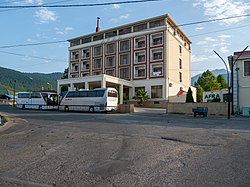Oğuz (city)
| Oğuz | ||

|
||
|
||
| State : |
|
|
| Rayon : | Oğuz | |
| Founded : | 1968 (city law) | |
| Coordinates : | 41 ° 4 ′ N , 47 ° 28 ′ E | |
| Height : | 640 m | |
| Residents : | 7,100 (2014) | |
| Time zone : | AZT ( UTC + 4 ) | |
| Telephone code : | (+994) 2421 | |
| Postal code : | AZ4800 | |
| License plate : | 48 | |
| Community type: | City (şəhər) | |
|
|
||
Oğuz , also Oghuz , is a city in Azerbaijan . It is the capital of the district of the same name . The name of the city is derived from the Oghuz , from whom the Azerbaijanis, Turks and Turkmens are descended. Until 1991 the city was called Vartaşen or Vartashen (from Armenian Վարդաշեն , Wartaschen ).
The city has a population of around 7100 (2014). The previously largely udic , Tatar and Armenian , predominantly Christian (mostly Armenian-apostolic ) and to a lesser extent Tatar - Jewish population of the city, in which around 3,000 Uden (out of about 10,000 people) spoke the local Wartaschen dialect of Udish , was expelled to Armenia in the course of the Nagorno-Karabakh conflict in the early 1990s. Today there are still around 50 Uden and up to 80 mountain Jews, but no Armenians left in the village.
In the city there is a restored old synagogue from 1906 and a modern mosque. There is also a Heydər Əliyev museum.
swell
- ↑ a b azerb.com about city and rayon
- ↑ Population by sex, economic and administrative regions, urban settlements of the Republic of Azerbaijan at the beginning of the 2014 ( Memento from July 16, 2014 in the Internet Archive ) on the website of the Azərbaycan Respublikasının Dövlət Statistika Komitəsi (State Statistics Committee of the Republic of Azerbaijan)
- ^ Marie-Carin von Gumppenberg, Udo Steinbach: The Caucasus: History - Culture - Politics. CH Beck, Munich 2008. p. 182.
- ↑ Manana Tandaschwili : Das Udische - Geschichte der Uden. Tbilisi / Frankfurt a. M., 2006.
- ↑ Sarah Marcus: Mountain Jews. Tablet, Tbilisi, January 18, 2018.
- ^ Michael Zand: Language and Literature. In: Liya Mikdash-Shamailov: Mountain Jews: Customs and Daily Life in the Caucasus. The Israel Museum (Muzeon Yisrael), Jerusalem 2002, p. 37.
- ^ Wolfgang Schulze: Towards a History of Udi. International Journal of Diachronic Linguistics 1, 2005, pp. 55-91.
- ↑ Tatul Hakobyan: Muslim Kurds and Christian Udis - The Karabakh war has displaced them from their homeland ( Memento of December 24, 2013 in the Internet Archive ). Hetq Online, November 13, 2006.
- ↑ Liya Mikdash-Shamailov: Mountain Jews: Customs and Daily Life in the Caucasus . Muzeon Yisrael. P. 67

